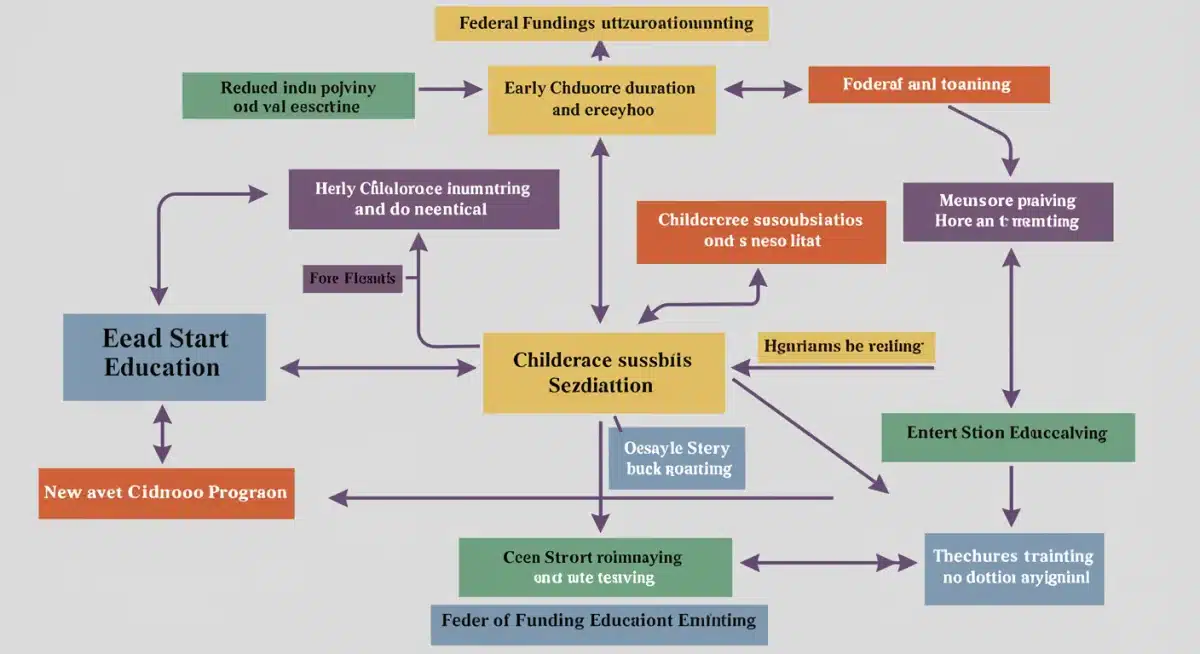Early Childhood Education: New Federal Initiatives for US Families in 2025

New federal initiatives impacting early childhood education for US families in 2025 are set to reshape access, affordability, and quality of programs for young learners, with significant implications for parents and providers nationwide.
Breaking news for US families: significant federal initiatives are poised to transform Early Childhood Education: New Federal Initiatives Impacting US Families in 2025 (RECENT UPDATES), marking a pivotal shift in how young children receive care and learning opportunities across the nation. These updates promise widespread changes in accessibility and support for both parents and educational institutions.
Understanding the New Federal Funding Landscape
As of late 2024, the federal government is rolling out an ambitious plan to bolster early childhood education programs, with a substantial increase in funding allocated for 2025. This move is designed to address long-standing issues of affordability and access, particularly for low-income families and underserved communities. The new funding mechanisms aim to streamline resources and ensure a more equitable distribution across states.
Reports from the Department of Education indicate that a significant portion of this budget increase will target direct subsidies for childcare and preschool programs. This is a direct response to recent economic analyses highlighting the prohibitive costs that many families face, often forcing difficult choices between work and early education. The goal is to make high-quality early learning a reality for more children, regardless of their family’s income.
Increased Subsidies for Childcare Providers
- Expanded Eligibility: New guidelines are expected to broaden the criteria for families to qualify for childcare subsidies, encompassing a wider income bracket.
- Provider Support: Funding will also assist childcare centers in meeting higher quality standards, including improved staff-to-child ratios and professional development opportunities for educators.
- Infrastructure Grants: Specific grants are being introduced to help renovate and expand existing childcare facilities, and to support the establishment of new ones in areas with critical shortages.
Expansion of Head Start and Early Head Start Programs
The venerable Head Start and Early Head Start programs are slated for a significant expansion in 2025, according to recent announcements from the Department of Health and Human Services. This expansion is not merely about increasing capacity but also about enhancing the quality and scope of services offered. The focus remains on comprehensive child development, addressing not just educational needs but also health, nutrition, and social-emotional well-being for children from birth to age five.
New federal guidelines emphasize a more integrated approach, encouraging partnerships between Head Start centers and local school districts to create smoother transitions for children entering kindergarten. This collaborative model is expected to reduce educational disparities and provide a more continuous learning pathway for young students. The initiatives also aim to strengthen family engagement, recognizing parents as their child’s first and most important teachers.
Focus on Holistic Development
The expanded programs are set to include enhanced resources for children with special needs, ensuring inclusive environments and specialized support services. There is also a renewed emphasis on early literacy and STEM (Science, Technology, Engineering, and Mathematics) education, preparing children for future academic success in an increasingly complex world.
- Health Screenings: Mandatory and more frequent health and developmental screenings will be incorporated to identify and address potential issues early.
- Parental Support: Workshops and resources for parents on child development, nutrition, and effective parenting strategies will be expanded.
- Mental Health Services: Increased access to mental health services for both children and families within the Head Start framework.
New Standards for Early Childhood Educators
A critical component of the 2025 federal initiatives is the introduction of new, higher standards for early childhood educators. The aim is to professionalize the field, ensuring that children receive instruction from highly qualified and well-compensated professionals. This includes updated requirements for training, certification, and ongoing professional development, according to reports from the national education task force.
The federal government is investing in programs that will help current and aspiring educators meet these new benchmarks. This includes scholarships for higher education in early childhood education, mentorship programs, and incentives for educators to work in underserved areas. The belief is that a robust, well-trained workforce is fundamental to delivering high-quality early learning experiences.
Professional Development and Compensation
The new standards are expected to lead to improved compensation for early childhood educators, addressing a long-standing issue of low wages in the sector. This is seen as crucial for attracting and retaining talent, ultimately benefiting the children in their care. States are encouraged to develop their own plans for implementing these standards, with federal support provided for compliance.

Universal Pre-Kindergarten Pilot Programs
Several states and localities are set to launch or expand universal pre-kindergarten (UPK) pilot programs in 2025, backed by new federal grants. These programs aim to provide free, high-quality preschool to all 4-year-olds, regardless of family income. The federal push for UPK is rooted in extensive research demonstrating the long-term benefits of early education, including improved academic outcomes, higher graduation rates, and increased earning potential.
The pilot programs will explore various models for delivering UPK, from expanding public school offerings to partnering with community-based childcare providers. The federal government will closely monitor these pilots to identify best practices and inform potential nationwide implementation in the future. This represents a significant step towards making early education a universal right in the US.
Key Features of UPK Pilots
- Voluntary Participation: While universal, participation in UPK programs will remain voluntary for families.
- Quality Benchmarks: All participating UPK programs must adhere to strict quality standards, including curriculum, teacher qualifications, and learning environment.
- Data Collection: Extensive data will be collected on student outcomes, program effectiveness, and economic impact to guide future policy decisions.
Leveraging Technology in Early Learning
The 2025 federal initiatives also place a strong emphasis on integrating technology into early childhood education, recognizing its potential to enhance learning experiences and improve program administration. New funding streams are available for centers to invest in age-appropriate educational technologies, as well as for training educators on how to effectively use these tools. This is not about replacing traditional teaching methods but augmenting them to create more dynamic and engaging learning environments.
Moreover, technology will play a crucial role in improving data collection and program evaluation, allowing federal and state agencies to better track the impact of these initiatives. Secure digital platforms will facilitate communication between parents and educators, and provide resources for at-home learning. The goal is to leverage innovation to support both children’s development and the efficiency of the early education system.
Digital Literacy and Access
Initiatives include providing resources to ensure digital equity, particularly for families in remote or low-income areas. This involves supporting access to reliable internet and devices, along with training on digital literacy for both parents and children. The focus is on responsible and beneficial use of technology to foster early cognitive skills.
Impact on US Families and Economic Benefits
The cumulative effect of these Early Childhood Education: New Federal Initiatives Impacting US Families in 2025 (RECENT UPDATES) is expected to be transformative for American families. Reduced childcare costs and increased access to high-quality programs will alleviate financial burdens, allowing more parents, especially mothers, to participate fully in the workforce. This, in turn, is projected to have significant positive impacts on the national economy.
Beyond the immediate financial relief, the long-term benefits for children are substantial. Early exposure to quality education is linked to improved school readiness, higher academic achievement, and better social-emotional development. These benefits not only contribute to individual success but also to a more skilled and productive future workforce. The federal government’s investment is seen as a strategic move to strengthen both human capital and economic stability.
Economic and Social Outcomes
- Workforce Participation: Increased availability of affordable childcare is anticipated to boost parental workforce participation, particularly for women.
- Reduced Inequality: By providing equitable access to early learning, the initiatives aim to reduce achievement gaps and promote social mobility.
- Long-Term Savings: Studies suggest that investments in early childhood education yield significant returns in terms of lower crime rates, reduced welfare dependence, and increased tax revenues in the long run.
| Key Initiative | Brief Description |
|---|---|
| Increased Federal Funding | Significant budget increases for childcare subsidies and early learning programs to enhance affordability and access nationwide. |
| Head Start Expansion | Broadening the reach and enhancing the quality of Head Start and Early Head Start programs for holistic child development. |
| Educator Standards & Support | New professional development, certification requirements, and improved compensation aimed at professionalizing the early childhood workforce. |
| Universal Pre-K Pilots | Federal grants supporting state and local pilot programs to offer free, high-quality preschool to all 4-year-olds. |
Frequently Asked Questions About 2025 Early Childhood Initiatives
The primary goals are to increase access to affordable, high-quality early childhood education for all US families, especially those in underserved communities. This includes expanding programs like Head Start, enhancing educator standards, and exploring universal pre-kindergarten options to improve child development and support parental workforce participation.
New federal funding is specifically allocated to increase subsidies for childcare and preschool programs. This is expected to broaden eligibility criteria for families, making high-quality early learning more affordable and accessible, thereby reducing the financial burden on parents across various income levels.
The initiatives introduce new, higher standards for early childhood educators, focusing on improved training, certification, and ongoing professional development. Federal investments also aim to address compensation, attracting and retaining qualified professionals to ensure better quality instruction and care for young children.
While the federal government is providing grants for universal pre-kindergarten (UPK) pilot programs, nationwide implementation is not expected in 2025. These pilots will help identify best practices and inform future policy decisions, moving towards a potential broader rollout in the years to come, but current availability will be localized.
New funding supports the investment in age-appropriate educational technologies and training for educators. Technology will enhance learning experiences, improve program administration, and facilitate data collection. There’s also a focus on ensuring digital equity and literacy for families, especially in underserved areas, to support at-home learning.
Looking Ahead: The Broader Implications
The implementation of these Early Childhood Education: New Federal Initiatives Impacting US Families in 2025 (RECENT UPDATES) signals a profound shift in national priorities, recognizing early learning as a foundational investment for societal well-being and economic growth. What happens next will involve careful monitoring of the pilot programs, ongoing adjustments to funding mechanisms, and continuous dialogue between federal, state, and local stakeholders. Families should stay informed about specific programs becoming available in their regions, as the rollout will be phased and localized initially. These initiatives are poised to reshape the educational landscape for generations to come, fostering a stronger, more equitable future for America’s youngest learners.





